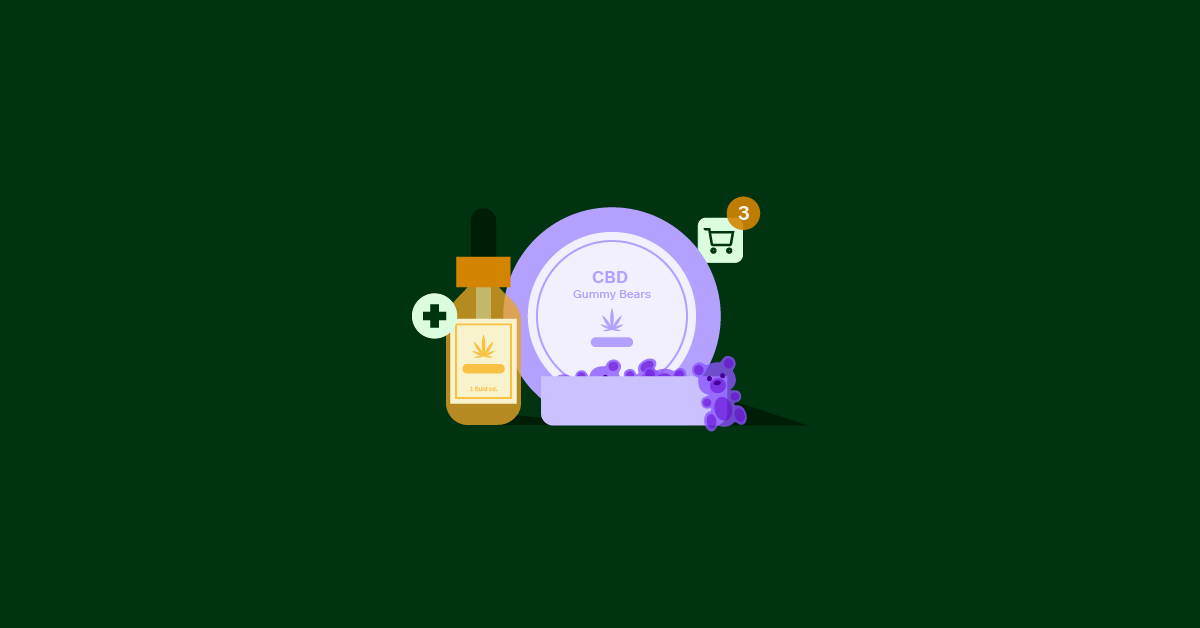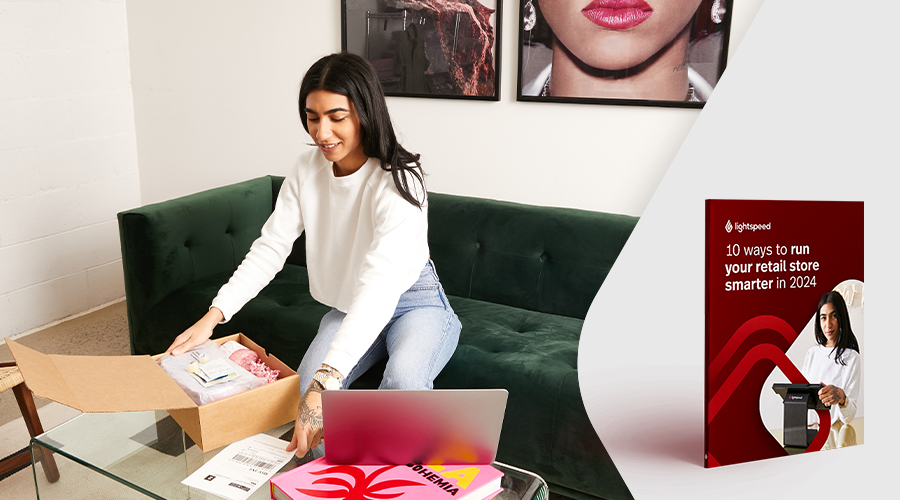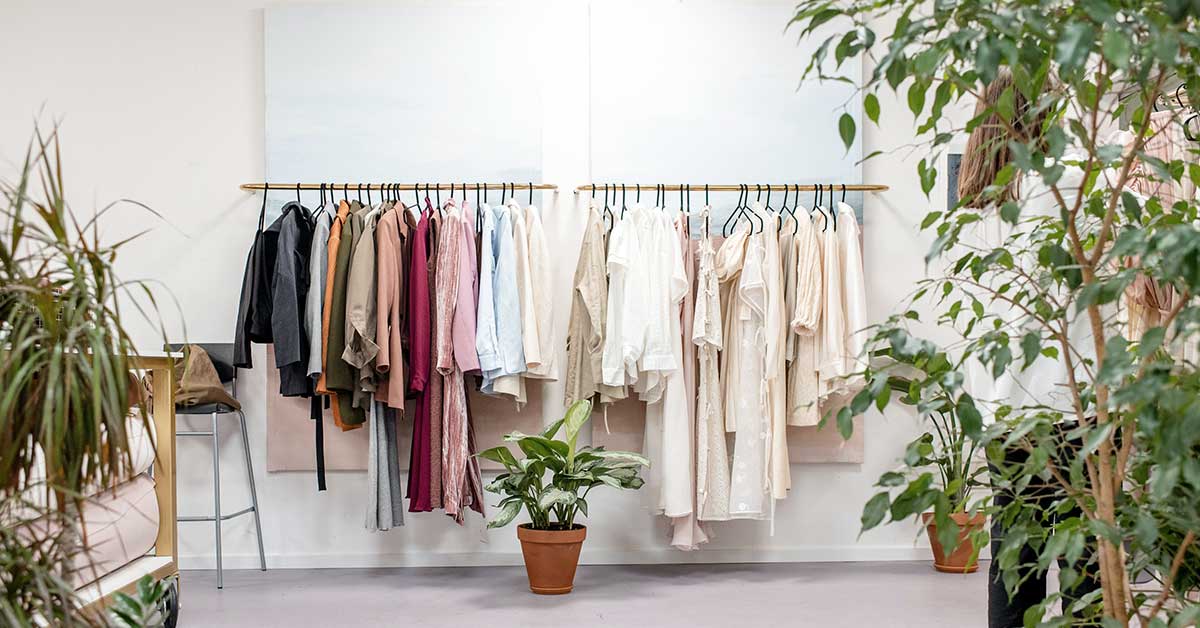
There’s no denying that the CBD (cannabidiol) industry has grown incredibly fast since the legalization of hemp-derived CBD in 2018. The global market for CBD hit $9.4 billion in 2023, just a scant few years after legalization in the US, and it’s not slowing down—by 2027, it’s expected to hit $31.85 billion.
Those are some massive numbers, and it’s worth asking: what’s driving all that growth?
And more importantly, how can retailers capitalize on the CBD market?
To answer these questions, we took a dive into the CBD industry and identified some emerging trends in the space. Whether you’re someone looking for business opportunities or you’re a CBD retailer who wants to grow your business, here are the top trends to keep an eye on.
In this blog, we’ll cover 8 trends to keep an eye on in 2024:
- Increased transparency and quality standards for CBD
- A greater focus on education
- High consumer interest in CBD for wellness
- Big name retailers in the market
- CBD retail for pets
- Greater interest in CBD beverages
- Other cannabinoids on the market
- CBD retail thriving both online and off
10 Ways to Run Your Retail Business Smarter in 2024
Our guide will walk you through the future-proof retail tactics that’ll keep your business flexible and efficient—a key to thriving in the new world of retail.

1. Increased transparency and quality standards
The CBD industry has transformed from a relatively obscure niche into a mainstream wellness phenomenon. However, as the popularity of CBD has soared, so have consumer expectations. Today, savvy customers are no longer satisfied with vague promises—they demand transparency, safety and superior quality when it comes to CBD products. Clearer labeling, third-party testing and higher-quality standards have become non-negotiable factors in the eyes of the discerning CBD consumer.
Even the FDA is getting involved, declaring in 2023 that existing regulatory frameworks for CBD are insufficient and that they plan to work with US Congress to develop updated rules.
For retailers, this signals a positive evolution within the industry. These developments provide an opportunity for retailers to distinguish themselves by prioritizing product quality. As the regulatory landscape evolves, customers will increasingly turn to brands that demonstrate a proactive commitment to safety and quality.
Take Lightspeed retailer SunMed, Your CBD Store, as an example. They develop their own premium, proprietary CBD products and put them through rigorous third-party testing. To earn customer trust, they lead that message, even letting customers view their lab reports to prove they stand behind their products.

Proactively investing in transparent labeling, third-party testing and sourcing higher-quality CBD products not only safeguards your customers, but also secures your position as a responsible and reputable retailer.
2. A renewed focus on customer education
Despite CBD’s surging popularity—one poll found that 60% of respondents had tried a CBD product—there remains a significant knowledge gap among consumers. For many, the world of CBD and its associated cannabinoids is a new and unexplored frontier. Studies have found that consumer knowledge, such as what levels of CBD mean, is low.
Customers may have heard about CBD, but not know its effects or what products they can access; if they do know about CBD, they might still lack awareness regarding other cannabinoids.
In order to make meaningful sales, CBD retailers must become educators first. Brands are shifting their focus from mere product promotion to empowering consumers with knowledge about CBD’s benefits, proper usage and potential effects.
But a need for education isn’t new—it’s been the name of the game since CBD was legalized. The real trend here is how quickly and comprehensively some retailers are delivering that education, which puts them in a prime position to dictate the conversation about CBD.
Successful CBD retailers are leveraging various platforms, from social media and websites to in-store workshops and informative packaging and email campaigns, to disseminate knowledge.
SunMed, Your CBD Store, reaches out to customers the day after they visit a Your CBD Store franchise location in person. Using purchase data from Lightspeed, SunMed crafts comprehensive educational emails that help customers continue their CBD discovery journey even after they leave the store.
“The day after they visit a store, they’re receiving the first email communication from us,” says Wilfredo Rodriguez, CFO of SunMed, Your CBD Store. “And it’s so critical for us to have that detailed transactional data in order to be able to engage with the customers at a very individualized level.”
They’re not waiting for customers to look up CBD knowledge themselves, and the quick send—right away, not a week later—helps them reinforce the in-store education they just got.
This quick educational approach not only demystifies CBD but also establishes retailers like SunMed, Your CBD Store, as trusted sources of information.
3. Consumers are searching for CBD wellness—often beating meditation, acupuncture and veganism in volume
After hemp-derived CBD was legalized in 2018, there was an explosion in interest in CBD’s wellness potential. CBD wellness quickly became the most-researched health and wellness trend on Google.
Industry data shows that searches that mentioned CBD and cannabidiol had 125.9% year over year increase in 2017 and 160.4% increase in 2018. As of 2019, there were 6.4 million CBD-related searches from Google. That’s 3 times more than meditation and 7 times higher than acupuncture.
Clearly, consumers want to learn about—and likely purchase—CBD products. But there’s a snag here for retailers: other businesses caught on, fast. Driving traffic to your site is harder now than it was four or five years ago.
So if you’re a player in the space, now is the time to beef up your presence on Google. Make sure your store is listed on Google My Business, so your store will show up in local searches.
A great example of a store with a strong Google presence comes from the SunMed, Your CBD Store in Thousand Oaks, California. In addition to having a complete Google profile with several positive reviews, Your CBD Store’s listing also has several great-looking photos showcasing the store and products.

4. Big retail will continue to fuel growth
CBD continues to make inroads in the retail industry (and the mainstream world in general). Cannabidiol products are increasingly gaining the trust of legislators and consumers.
This has prodded larger retailers to embrace—or at least be more open to—CBD products. Walgreens, for example, is now selling CBD products in almost 3,860 stores in select states. Meanwhile, The Vitamin Shoppe also hopped on the CBD train by partnering with trusted brands in the space.
Big retail’s adoption of CBD also benefits small to medium businesses. CBD products being more prevalent on the shelves of mainstream retailers lends credibility and increases consumer confidence in cannabidiol.
The more mainstream CBD becomes, the better it is for the industry as a whole—and that includes large and small retailers alike.
5. The pet segment presents a massive opportunity
It’s not just people who are fans of CBD products. Pets (or at least the humans who own them) are also adopting CBD. Nielsen and Headset’s 2020 Pet Industry Green Paper predicts that hemp-based CBD pet products will represent 3-5% of all CBD sales in the United States by 2025.
Almost three-quarters of current CBD consumers have pets, and almost one-quarter of U.S. pet owners already use CBD for themselves, their pets or both. Nearly 26% of U.S. adults with dogs are using hemp-CBD products. Half of those already use CBD for their dogs, while the other half only use it for themselves.
What does this mean for retailers?
Going into 2024, expect to see CBD for pets go from a niche market to more mainstream. If you’re a CBD merchant, you may want to consider expanding your range to include merchandise for your customers’ furry friends. If you’re a pet supplies store, see if it makes sense to start carrying CBD products.
But don’t just carry any CBD pet products. Manufacturing CBD products with organic materials helped boost the pet products industry in 2023. Pet owners are clearly concerned about the quality of CBD products.
If you manufacture your own CBD products, emphasize the natural materials you use (and/or boost your supply chain to make it more organic). If you’re looking to carry CBD products by other companies, select a supplier with a lot of emphasis on rigorous testing and organic materials.
6. CBD beverage sales are on the rise
CBD beverages had the biggest gains in 2023, with sales up 36.5%. Expect at least some of that energy to continue into 2024.
Beverages capture the interest of consumers who seek a convenient way to incorporate CBD into their daily routines. CBD-infused sodas and sparkling water, for instance, have emerged as alternatives for those looking to enjoy the benefits of CBD in a familiar and enjoyable format.
For retailers, this is a lucrative market. Almost half of CBD beverage drinkers are daily consumers, which BevNet found to be more regular use than other CBD products like tinctures and gummies.
7. The rise of cannabinoids beyond CBD
Beyond the well-known CBD, there exists a spectrum of other compounds. Cannabinoids like CBG (cannabigerol) and CBN (cannabinol) are gaining attention for their unique properties, adding an extra layer of complexity to the world of CBD-infused products.
More controversially, compounds like Delta-8 and Delta-9 THC have come on the market as well, but these compounds are subject to more regulation as states take notice of them.
As customers become more and more educated about CBD, and as more customers try CBD, developing CBG and CBN products and educating customers about their potential will help CBD retailers stand out in 2024.
8. Brick-and-mortar + ecommerce is a winning combination
Generally, CBD products are best sold offline, because consumers typically have a lot of questions about cannabidiol. It’s always great to have in-store associates explain how different oils, supplements, creams and other items work, so shoppers can make informed decisions.
But once a customer is educated on CBD and confident in their purchases, they’re probably going to want the convenience of ecommerce at least some of the time. If they can’t turn to you, they’ll find a competitor.
It’s more important than ever for CBD merchants to adopt an omnichannel approach to retail. If you’re already selling offline, be sure to set up shop online. And if you already have an ecommerce site, don’t overlook brick-and-mortar retail. The CBD space is becoming more crowded; having a strong online and offline presence is the best way to compete.
The good news is launching an online arm of your business doesn’t have to be hard. Setting up an ecommerce store is easy with Lightspeed eCom’s Instant Site—just pick a pre-made theme, customize it, and go.

Selling CBD? Arm your retail business with the right tools and data
With the CBD industry growing and changing rapidly, keeping up can be a challenge.
- What products should you stock up on?
- What’s the next big thing?
- Which customers should you market to?
The best way to stay on top of everything is to arm your business with a retail management system that gives you the tools and data you need to get ahead.
Lightspeed’s commerce platform, from our POS to our inventory management and customer loyalty software, is the best choice for your CBD store. Whether you sell in one store or many, at events or trade shows, Lightspeed can power sales, customer management, stock control and reporting for your CBD business.
Click here to discover how Lightspeed can take your CBD retail business to new heights.
CBD Trends FAQs
How big is the US CBD market?
As of 2023, the US CBD market is worth more than $1 billion, and is expected to keep growing.
Is the CBD industry declining?
While some CBD products saw slowed growth in 2023, others, such as CBD beverages, are growing at an impressive rate.. The CBD market is dynamic and influenced by various factors, including regulatory changes, consumer trends and economic conditions.
Are CBD products still popular?
CBD products are indeed popular and experiencing significant growth in popularity.
CBD, or cannabidiol, originally gained attention for its potential therapeutic benefits without the psychoactive effects associated with THC (tetrahydrocannabinol). Many people have turned to CBD for reasons such as relaxation, stress relief, and potential relief from various health conditions.
The popularity of CBD is reflected in the wide range of available products, including oils, tinctures, capsules, edibles, topicals and more. CBD has been incorporated into various wellness and beauty products, further contributing to its widespread appeal.
Is the CBD market oversaturated?
The CBD market is experiencing rapid growth, and there have been concerns about potential oversaturation in certain segments. The market has become increasingly crowded with a wide range of CBD products, brands and retailers.
While this competition is a sign of the industry’s popularity and expansion, it has also led to challenges for businesses in terms of differentiation, quality control and market positioning.
As with all popular markets, retailers must work hard to stand out.
Is CBD a booming business?
The CBD industry can be considered a booming business. The increased popularity of CBD products for various purposes, including wellness, relaxation and potential health benefits, have contributed to the industry’s expansion.
The growth of the CBD industry is fueled by factors such as increased awareness of CBD, changing attitudes toward cannabis and the pursuit of alternative wellness options. Many consumers have sought out CBD products for their perceived therapeutic properties without the psychoactive effects associated with THC.
What percentage of Americans use CBD?
One poll found that 60% of Americans surveyed have tried CBD, with strong differentiation by age—only about a third of Americans aged 18 to 25 have used CBD, while 90% of Americans 77 and up have used it.

News you care about. Tips you can use.
Everything your business needs to grow, delivered straight to your inbox.


![11 Tips To Make Your Pop-Up Shop a Roaring Success [For Retail Store Beginners and Pros Alike]](https://blog-assets.lightspeedhq.com/img/2021/06/2da3ae10-blog-hero_pop-up-shop.jpg)